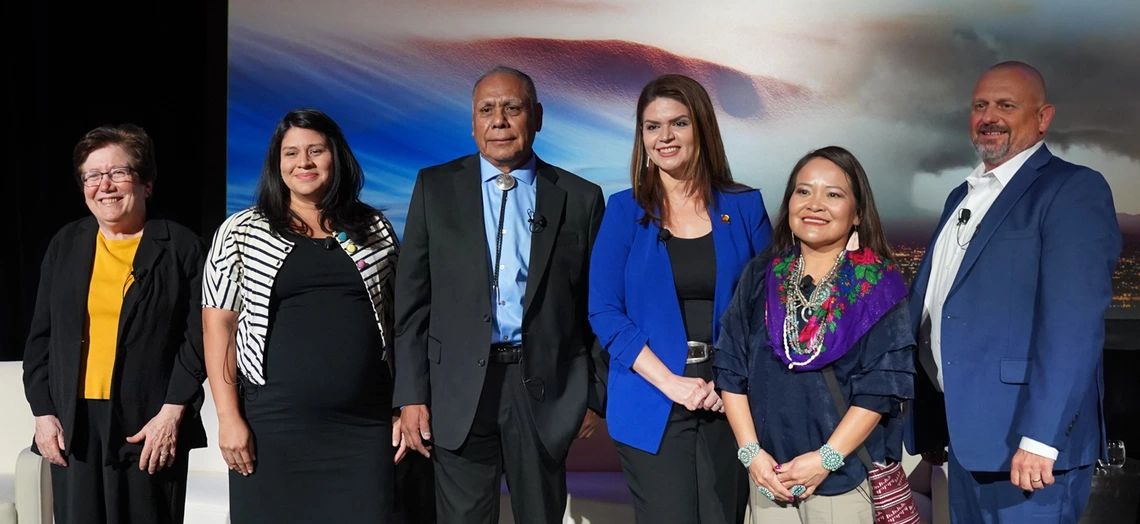WRRC Participates in One Water Summit

The US Water Alliance’s 2023 One Water Summit was held in Tucson on November 14–16. This annual event gathers one of the most diverse groups of water leaders in the country for a unique and urgent conversation about the future of water. This year’s Summit welcomed 972 registrants from 322 cities across 46 states, including several attendees from the WRRC. The One Water concept is centered around a holistic approach to water management, valuing every drop, with core principles of water equity, affordability, and access. On Wednesday, November 15, WRRC Director Sharon B. Megdal moderated the opening plenary panel, Tucson’s Water Story, with five panelists: UArizona Indigenous Resilience Center Director Karletta Chief, Chairman of the San Xavier District of the Tohono O’odham Nation Austin Nunez, artist Alexandra Jimenez, Tucson Water Director John Kmiec, and Tucson Mayor Regina Romero. The panel emphasized equity, collaboration, and connecting with the community on water projects. After a brief presentation from each individual, Megdal engaged them in a Q&A about the meaning of “resilience,” in which the panelists spoke about their own experiences with resilience and the importance of caring for the environment around us to ensure it continues to care for us. The Summit featured many other excellent panels, presentations, and workshops, two of which are highlighted here.
On Wednesday, November 15, the One Water Summit featured a workshop titled Water and Sanitation Access in the United States. Four panelists discussed how water and sanitation access challenges in Maryland, West Virginia, the Navajo Nation, and internationally (Rwanda, Bolivia, and Peru) have impaired the residents’ physical, emotional, and psychosocial well-being. Some barriers to water, sanitation, and hygiene (WaSH) included industrial expansion, population growth, institutionalized racism, lack of education or follow-up, and aging infrastructure. To overcome these challenges, the panel underscored the importance of partnerships, building bridges to connect silos, and the power of listening when implementing solutions. Organizations represented on the panel included the US Water Alliance, Planet Women, the USEPA, DigDeep, and Water for People with community partners, scientists, anthropologists, engineers, physicians, etc. working towards the United Nations Sustainable Development Goal 6: safe water and sanitation for all.
On Thursday, November 16, one of the closing sessions was hosted by EcoTruths for Indigenous Youth. The workshop, titled Re-Searching & Re-Membering Indigenous Kinships with Land and Life through Water Relations, provided the opportunity for Indigenous youth to host water dialogues. The EcoTruths program welcomes indigenous youth aged 8–22, named “Seeds” throughout the program, to foster understanding about their culture, preserve their native tongue, and connect with Mother Earth through education, outreach, and field trips led by “Bloomers” or Indigenous elders. Instead of the traditional panel lecture and discussion approach, the Seeds, one as young as eight years old, posed questions to the audience, leading to deep reflection and thought-provoking conversations. The audience, full of engineers, politicians, researchers, and educators, was asked by the Seeds to share their industry’s current approach to preserving wildlife, ecosystems, and water. The session closed with an indigenous prayer and blessing to empower audience members to plan for seven generations when implementing solutions to unclean water, deforestation, and loss of biodiversity.

